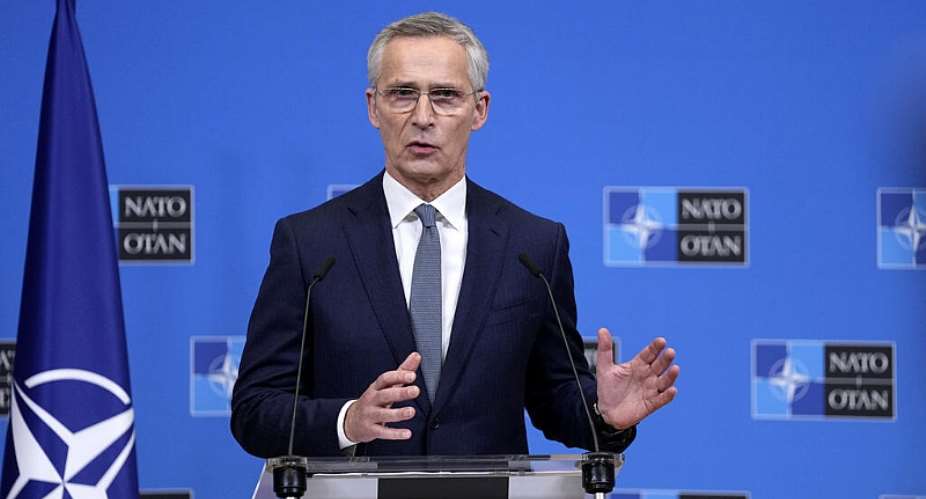White House hopeful Donald Trump's remark on Saturday that he would "encourage" Russia to attack members of NATO who had not met their financial obligations has drawn a fierce reaction from the EU.
Trump ignited a political firestorm and sent a chill through the United States' European allies on Saturday when he said he would "encourage" Russia to attack any NATO country that does not meet financial obligations.
"Let's be serious. NATO cannot be an a la carte military alliance, it cannot be a military alliance that works depending on the humour of the president of the US day to day", Josep Borrell, the EU's High Representative for Foreign Affairs and Security Policy, said.
"It exists or it does not exists," he said, adding that he was not going to keep commenting on "any silly idea" emerging from the US presidential election campaign.
US President Joe Biden called Trump's comments "appalling and dangerous".
NATO chief Jens Stoltenberg warned Sunday that "any suggestion that allies will not defend each other undermines all of our security, including that of the US".
Trump, 77, is all but assured of the Republican nomination for the White House in the November vote against Biden, 81.
EU's 'strategic autonomy'?
Trump's remark may help strengthen Europe and push it to become more independent of the United States.
In a White Paper published in 2013, the European Commission proposed a "Common Security and Defence Policy (CSDP)" that stressed EU defence budgets "are constrained, limiting the ability to develop, deploy, and sustain military capabilities," pointing out that "fragmented European defence markets jeopardise the sustainability and competitiveness of Europe's defence and security industry."
The paper argues for "enhance[d] Europe's defence capabilities."
In France, President Emmanuel Macron followed up with his idea on European "strategic autonomy" which he launched in 2017 in his "Plan for a Sovereign Europe."
He did not get much support from other EU countries. Berlin was reluctant and other countries simply didn't give it much thought.
But after the Trump presidency (2017-2021) and, later on, after Russia's invasion of Ukraine in 2022, the plan entered the spotlight again.
During a visit to the Netherlands in 2023, Macron reiterated his ideas for the future of the EU, elaborating on his 2017 "plan for Europe."
The plan contains six "keys" to European sovereignty, including a common defence budget, streamlining immigration and asylum procedures, and developing a new partnerships with Africa. Europe should allign social and fiscal policies, and strengthen democracy by promoting national and local debate.
Weimar Triangle
Underpinning Macron's ideas is the "Weimar Triangle," which envisages cooperation between France, Germany and Poland and which was created in 1991, just after the fall of the Berlin Wall. The Triangle aims at integrating European defence cooperation, but never really took off - until today.
Today, diplomats of France, Germany and Poland are launching a joint initiative to fight Russian disinformation attacks as Moscow's invasion of Ukraine enters a third year.
The trio will meet at a historic chateau outside Paris as Polish Prime Minister and former EU chief Donald Tusk visits France and Germany on Monday to tighten Warsaw's cooperation with Paris and Berlin.
French Foreign Minister Stephane Sejourne will host German counterpart Annalena Baerbock and Radoslaw Sikorski of Poland at the Chateau de La Celle-Saint-Cloud just outside Paris.
(With newswires)





 He proposed marriage to me online while in abroad — Celestine Donkor reveals how...
He proposed marriage to me online while in abroad — Celestine Donkor reveals how...
 Having one hit-song after 20-years makes you worthless of my attention — Strongm...
Having one hit-song after 20-years makes you worthless of my attention — Strongm...
 ‘It was painful, annoying’ — Sister Derby opens up on Medikal and Fella’s relati...
‘It was painful, annoying’ — Sister Derby opens up on Medikal and Fella’s relati...
 It's baseless, without foundation — Lawyer denies allegations of stealing client...
It's baseless, without foundation — Lawyer denies allegations of stealing client...
 You’re son of Gonjaland and you’ve my blessing to be President – Gonja King to B...
You’re son of Gonjaland and you’ve my blessing to be President – Gonja King to B...
 Galamsey: I will involve traditional leaders in granting mining licences – Maham...
Galamsey: I will involve traditional leaders in granting mining licences – Maham...
 We’ll establish joint action team to reclaim destroyed ‘galamsey’ lands – Mahama
We’ll establish joint action team to reclaim destroyed ‘galamsey’ lands – Mahama
 Cecilia Dapaah scandal: She stashed about $1m in her home to make profit when do...
Cecilia Dapaah scandal: She stashed about $1m in her home to make profit when do...
 Bawumia’s claim of cedi performing better under NPP government than Mahama ridic...
Bawumia’s claim of cedi performing better under NPP government than Mahama ridic...
 Henry Quartey has shown that I got him whatever he’s enjoying now – Shiekh IC Qu...
Henry Quartey has shown that I got him whatever he’s enjoying now – Shiekh IC Qu...
